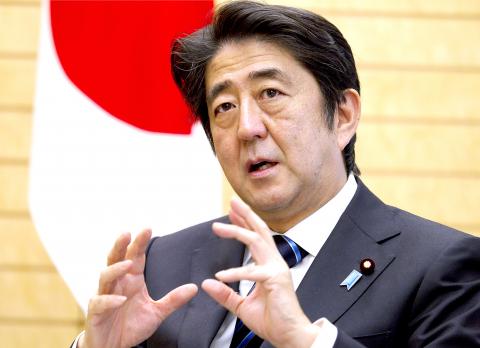Japanese Prime Minister Shinzo Abe called for a summit with Chinese President Xi Jinping (習近平) to reset relations after an escalation in bilateral tensions, invoking a 2006 visit to Beijing during his first administration.
“Since there are issues, it is all the more important to have a leaders’ meeting,” Abe said in an interview in the prime minister’s official residence in Tokyo. “I visited China as prime minister and met with [former Chinese president] Hu Jintao (胡錦濤) and we shared the view that we should develop our ties based on a strategic, mutually beneficial relationship. Now is the time to go back to that starting point.”
Abe’s call on Friday is his most explicit yet for a summit since China’s declaration last month of an air defense identification zone (ADIZ) that overlaps with Japan’s over the East China Sea.

Photo:Bloomberg
Abe has yet to hold a summit with either Xi or South Korean President Park Geun-hye, amid continuing territorial disputes with both neighbors. The impasse is a contrast from Abe’s 2006-2007 term in office, when he repaired ties with China that had frayed under his predecessor, former Japanese prime minister Junichiro Koizumi — whose visits to a national war shrine stirred Chinese resentment.
Asked whether China is open to a summit with Japan, Chinese Foreign Ministry spokesman Hong Lei (洪磊) told reporters in Beijing on Friday that “the problem is Japan cannot look straight at history and reality, and do the right thing on certain issues. So we once again ask Japan to look at history and reality, and pursue the same direction as China.”
The US urged China on Friday to set up an emergency hotline with Japan and South Korea to avoid confusion in its ADIZ.
Washington does not recognize Beijing’s ADIZ and has called on China not to press ahead with its implementation.
“As we work through this process, they need to do a few things right now to immediately lower tensions,” US Department of State deputy spokeswoman Marie Harf said.
“China should work with other countries, including Japan and South Korea, to establish confidence-building measures, including emergency communications channels to address the dangers that its recent announcement has created,” she added.
Meanwhile, Australian Minister of Foreign Affairs Julie Bishop defied a stern rebuke from Beijing yesterday to repeat concerns that the ADIZ has increased regional tensions.
“Australia is concerned about peace and stability in our region, and we don’t want to see any escalation of tensions, we want to see a de-escalation,” she told reporters in Beijing when asked about Australia’s stance on the ADIZ.
Her remarks came after China’s Minister of Foreign Affairs Wang Yi (王毅) on Friday reproached Bishop for Australia’s critical stance on the ADIZ.
Wang accused Australia of “jeopardizing bilateral mutual trust,” and said “the entire Chinese society and the general public are deeply dissatisfied” with Australia’s comments, Australian broadcaster ABC reported.
Bishop dismissed suggestions that the ADIZ dispute had damaged relations and said that negotiations on several issues, including a free-trade deal between the two countries, had been “productive.”

DAREDEVIL: Honnold said it had always been a dream of his to climb Taipei 101, while a Netflix producer said the skyscraper was ‘a real icon of this country’ US climber Alex Honnold yesterday took on Taiwan’s tallest building, becoming the first person to scale Taipei 101 without a rope, harness or safety net. Hundreds of spectators gathered at the base of the 101-story skyscraper to watch Honnold, 40, embark on his daredevil feat, which was also broadcast live on Netflix. Dressed in a red T-shirt and yellow custom-made climbing shoes, Honnold swiftly moved up the southeast face of the glass and steel building. At one point, he stepped onto a platform midway up to wave down at fans and onlookers who were taking photos. People watching from inside

A Vietnamese migrant worker yesterday won NT$12 million (US$379,627) on a Lunar New Year scratch card in Kaohsiung as part of Taiwan Lottery Co’s (台灣彩券) “NT$12 Million Grand Fortune” (1200萬大吉利) game. The man was the first top-prize winner of the new game launched on Jan. 6 to mark the Lunar New Year. Three Vietnamese migrant workers visited a Taiwan Lottery shop on Xinyue Street in Kaohsiung’s Gangshan District (崗山), a store representative said. The player bought multiple tickets and, after winning nothing, held the final lottery ticket in one hand and rubbed the store’s statue of the Maitreya Buddha’s belly with the other,

‘COMMITTED TO DETERRENCE’: Washington would stand by its allies, but it can only help as much as countries help themselves, Raymond Greene said The US is committed to deterrence in the first island chain, but it should not bear the burden alone, as “freedom is not free,” American Institute in Taiwan Director Raymond Greene said in a speech at the Institute for National Defense and Security Research’s “Strengthening Resilience: Defense as the Engine of Development” seminar in Taipei yesterday. In the speech, titled “Investing Together and a Secure and Prosperous Future,” Greene highlighted the contributions of US President Donald Trump’s administration to Taiwan’s defense efforts, including the establishment of supply chains for drones and autonomous systems, offers of security assistance and the expansion of

STREAMLINED: The dedicated funding would allow the US to transfer equipment to Taiwan when needed and order upgraded replacements for stockpiles, a source said The US House of Representatives on Thursday passed a defense appropriations bill totaling US$838.7 billion, of which US$1 billion is to be allocated to reinforcing security cooperation with Taiwan and US$150 million to replace defense articles provided to the nation. These are part of the Consolidated Appropriation Act, which the US House yesterday passed with 341 votes in favor and 88 against. The act must be passed by the US Senate before Friday next week to avoid another government shutdown. The US House Committee on Appropriations on Monday unveiled the act, saying that it allocates US$1 billion for the Taiwan Security Cooperation Initiative